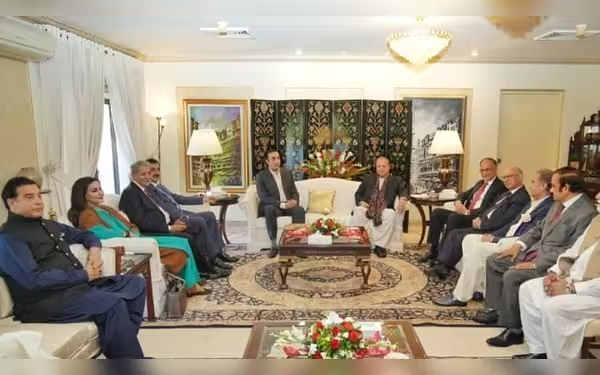Saturday, November 16, 2024 04:40 PM
Nawaz Sharif Advocates for Democratic Stability in Pakistan
- Nawaz emphasizes preventing individual destabilization of democracy.
- Leaders discuss economic progress and political unity.
- Record remittances signal positive economic health.
 Image Credits: thenews
Image Credits: thenewsNawaz Sharif stresses the importance of preventing individual threats to democracy during a meeting with Bilawal Bhutto-Zardari.
In recent discussions surrounding Pakistan's political landscape, the emphasis on safeguarding democracy has taken center stage. Nawaz Sharif, the President of the Pakistan Muslim League-Nawaz (PML-N) and a former three-time prime minister, has voiced strong concerns regarding the potential for any individual to disrupt the democratic framework of the country. His remarks came during a significant meeting with Bilawal Bhutto-Zardari, the Chairman of the Pakistan People’s Party (PPP), held at Punjab House in Islamabad.
During their meeting, both leaders expressed satisfaction with the notable decline in the inflation rate, which has dropped from a staggering 32% to a more manageable 6.9%. They also discussed the reduction in the policy rate and the overall economic progress that Pakistan has been experiencing. A highlight of their conversation was the record remittances of $8.8 billion sent by overseas Pakistanis, which they viewed as a positive indicator of economic health.
Nawaz and Bilawal shared a sense of optimism regarding the future of Pakistan, particularly in light of the recent arrival of a Saudi investor delegation and the upcoming Shanghai Cooperation Organisation (SCO) summit in the capital. They believe these developments signify a positive trajectory for Pakistan’s international standing and economic growth.
Reflecting on the past, Nawaz emphasized the significance of the 2006 Charter of Democracy (CoD), which he described as a historic and timely decision. He credited the charter with stabilizing democracy in Pakistan, allowing parliamentary terms to be completed, and uniting political factions against non-democratic forces that have historically incited unrest. He called for a justice system that prioritizes institutional integrity and public opinion over individual influence, ensuring that no one can undermine the democratic process at will.
Nawaz stated, “Today’s economic success relies heavily on political unity and agreement.” He reiterated that the CoD underscores the necessity for all political forces to collaborate in achieving both economic and political stability, ultimately paving the way for a prosperous nation. He highlighted the unity between the PPP and PML-N in promoting political tolerance, constitutional law, and parliamentary supremacy.
Bilawal Bhutto-Zardari reciprocated by praising the contributions of former Prime Minister Benazir Bhutto and Nawaz Sharif in advancing democracy in Pakistan. He stressed the importance of continuing this journey and acknowledged Nawaz’s extensive experience and leadership, noting that Pakistan stands to gain significantly from his political insights.
However, the political landscape remains fraught with challenges. Last month, the coalition government attempted to pass a controversial constitutional package amid speculation regarding a potential extension of Chief Justice of Pakistan Qazi Faez Isa’s tenure. This effort faltered when the Jamiat Ulema-e-Islam (F) chief withdrew support, leaving the proposed amendments in limbo. The government was reportedly short of 13 votes in the National Assembly and nine in the Senate, as the legislation requires a two-thirds majority in both houses.
The discussions between Nawaz Sharif and Bilawal Bhutto-Zardari highlight a crucial moment for Pakistan’s democracy. Their commitment to political unity and stability is essential for the country’s progress. As Pakistan navigates its complex political landscape, the emphasis on collaboration and the protection of democratic values will be vital in ensuring a brighter future for its citizens. The path forward may be challenging, but with collective efforts, there is hope for a more stable and prosperous Pakistan.













